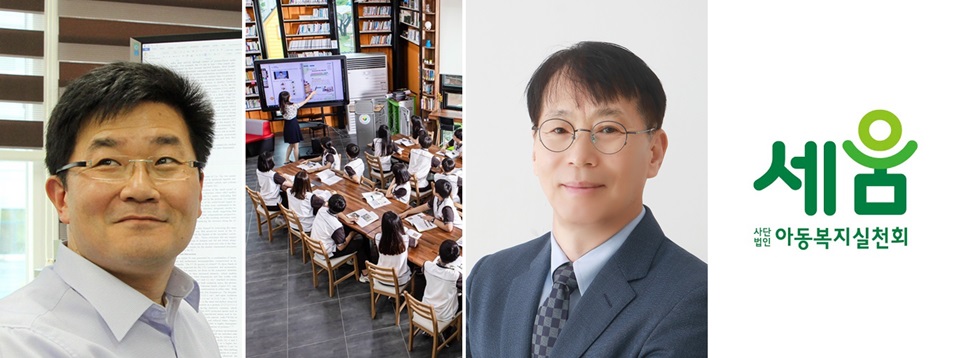|Winners in four categories: Science, Education, Community Development & Philanthropy, and Technology
|The awards ceremony to held on April 6 at the POSCO Center

▲ (From left) Science prize awardee Professor Mu-Hyun Baik of KAIST, Education prize awardee Sacheon Yongnam Middle School, Gyeongnam, Technology prize awardee CEO Han Jeong of i3 System, and Community Development & Philanthropy prize awardee Seum.
POSCO TJ Park Foundation (Chairman Sun-Uk Kim) held its board meeting on February 26 and announced the winners of the POSCO TJ Park Award 2021. “Professor Mu-Hyun Baik of KAIST” received the Science Prize and “Sacheon Yongnam Middle School” received the Education Prize. The Community Development & Philanthropy Prize went to “Seum,” a child welfare association, and the Technology Prize went to the “CEO of i3 System”.
Professor Mu-Hyun Baik defined the principle behind chemical reactions triggered through transition metal catalysts and established a principle that facilitates better catalyst development. Professor Baik is a pioneer in transformative research, demonstrating that chemical reactions can be predicted and designed using computers and theoretical and computational chemistry research methods.
In 2016, professor Baik predicted a catalytic candidate material that can activate methane gas through computational chemistry. And in 2020, he presented the possibility of a multi-functional group that can freely control the atomic cluster that determines the electrical properties of organic compounds using minor differences in voltage. Baik’s research achievement is deemed innovative since it can replace the conventional paradigm. Also, it is expected to trigger ripple effects if future research results are applied to the chemical industry.
The awardee of the Education prize, Yongnam Middle school, is situated in Sacheon, Gyeongnam. Until 2011, the school was on the verge of closing down owing to a drop in the number of students since the overall population of Sacheon City was in a decrease. However, the teachers led on innovation with students, parents, and the local community taking active parts and offering full support. As a result, the school has been transformed into an innovative one and placed itself at the center of national education.
Especially, the teachers remodeled the teacher’s room like a coffee shop and offered various spaces for students to rest and play or enjoy the culture and their education. On encountering the COVID-19 era, the school introduced digital class management where both students and teachers can interact. The school’s innovations attained high evaluation for presenting a successful future model for schools in rural areas.
Founded in 2015, Seum, an organization protecting children’s rights, is the first in Korea to offer support for the children of prison inmates so that they can live as desired. The organization received high appreciation for establishing an integrated and sustainable support platform for the children and families of prison inmates by pursuing structural and institutional changes.
Since its establishment, Seum has been providing basic support, such as urgent living expenses, daily necessities, and medical expenses, scholarships for academic support, and various mentoring programs so that the children of prison inmates can live properly. The organization has been practicing other activities as well, including integrated support for other family members of the inmates. Protecting the rights of the children of the inmates, Seum has played a significant role in changing related policies through various activities.
The winner of the Technology Prize, Han Jeong, is the CEO of i3 Systems and Korea’s first-generation researcher in the field of infrared image sensors. CEO Jeong has been devoted only to the development of infrared image sensors for over 30 years. After obtaining a doctorate at KAIST, Jeong set up the company in 1998 and accelerated the development of infrared image sensors, playing a crucial role in making Korea the seventh country in the world to mass-produce infrared image sensors.
The infrared image sensor that CEO Han Jeong developed and successfully mass-produced for the first time in Korea is used to identify objects in dark spaces. Demand for the item is high in national strategic fields, such as defense, space, and health care. In particular, the 12㎛ class ultra-small infrared image sensor, recently developed with the company’s own technology, is an essential component for autonomous vehicles. Previously, it was commercialized only in the United States worldwide. However, the success of this technology has laid the foundation for Korea to advance as a technology leader in the infrared image sensor field.
The POSCO TJ Park Foundation has been abiding by the principles of corporate citizenship through the establishment of the POSCO TJ Park Award since 2006, with a view to spreading public interest and participation in POSCO’s founding philosophy: creativity, talent cultivation, and community service.
The POSCO TJ Park Prize has four categories: Science, Education, Community Development & Philanthropy, and Technology prize. Each recipient will receive 200 million KRW. The Science Prize is given to Korean scientists who have made creative achievements in the fields of natural science or applied science, based on domestic research activities, contributing to raising the national status and developing science and technology. The Educational Prize recognizes individuals or organizations who have systematically carried out creative education programs that help improve the overall education system. The Community Development and Philanthropy Prize Award is given to an individual or an organization who devoted themselves to community service. The award eligibility is expanded to entire Asia in line with the Foundation’s principal program, Asia Fellowship. The Technology Prize acknowledges the efforts in various industry sectors and academic institutions and specifically recognizes those who saw the development and commercialization of world-class technologies and contributed to various industries across Korea.
The 2021 POSCO TJ Park Award Ceremony is scheduled for April 6 at the POSCO Center in Seoul. Due to the aftermath of COVID-19, the scale of the award ceremony will be greatly reduced and the entire ceremony will be broadcast live through the POSCO TJ Park Foundation YouTube channel.
